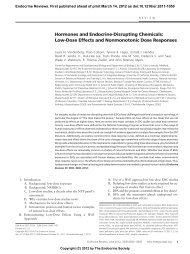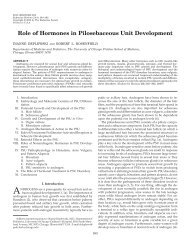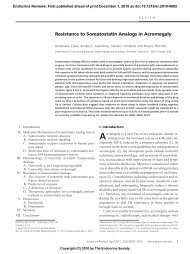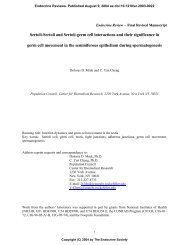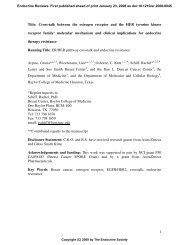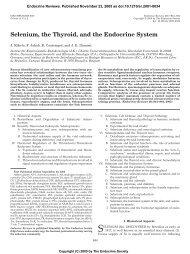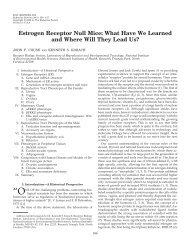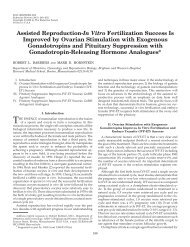1 BETA-CELL FAILURE IN DIABETES AND PRESERVATION BY ...
1 BETA-CELL FAILURE IN DIABETES AND PRESERVATION BY ...
1 BETA-CELL FAILURE IN DIABETES AND PRESERVATION BY ...
You also want an ePaper? Increase the reach of your titles
YUMPU automatically turns print PDFs into web optimized ePapers that Google loves.
24<br />
Optimal metabolic control, especially early intensive glycemic control, plays a role<br />
in the prevention of progressive beta-cell dysfunction and possibly destruction of the beta-<br />
cells with worsening of diabetes. Many reports have shown that induction of<br />
normoglycemia in DM2 results in both improved beta-cell function and insulin resistance<br />
(90, 91). Rarely, however, has a prolonged benefit been demonstratedwith virtually all<br />
patients becoming hyperglycemic again after a few weeks (92, 93). Until recently it was<br />
unknown whether such outcomes pertained to new-onset DM 2, although patients having<br />
failed diet therapy may show a good response to a short period of intensive insulin therapy<br />
by continuous subcutaneous insulin infusion :CSII (94). Ryan et al (84) recently reported<br />
that, in 16 severe (mean fasting plasma glucose of 239 mg/dl) newly diagnosed DM2<br />
patients, a 2 to 3 weeks` course of intensive insulin therapy by multiple daily insulin<br />
injection (NPH + regular) was able to maintain good glycemic control at 1 year in 7 of the<br />
subjects on diet therapy alone, whilst 8 required oral hypoglycemic agent and 1 required<br />
insulin therapy. The distinguishing features of those who did not require oral agents or<br />
insulin treatment were that they required less insulin during the active insulin therapy phase<br />
(0.37±0.05 vs. 0.73±0.07 units/kg/day) and were able to attain a lower fasting serum<br />
glucose at the end of the period of insulin therapy (106±5 vs. 139±7 mg/dl) . It is<br />
interesting to highlight that the majority of the study patients (15/16) had an evident<br />
recovery of the AUC insulin (oral glucose tolerance test) after the end of insulin therapy,<br />
being dramatically higher than study entry values associated with a significant reduction in<br />
AUC glucose by year end, probably related to the correction of gluco- and lipotoxicity<br />
(significant reduction in triglycerides and FFAs). Thus, the potential benefits of early,<br />
aggressive intervention with insulin therapy to counter both beta-cell dysfunction (and<br />
insulin resistance) must be considered: effects of insulin therapy against chronic<br />
hyperglycemia and lipotoxicity-induced apoptosis of the beta-cells.<br />
In a similar study (85), 138 newly diagnosed DM2s with fasting glucose >200 mg/dl<br />
were hospitalized and treated with CSII for 2 weeks.After CSII the patients were followed<br />
longitudinally on diet alone. Optimal glucose control was achieved within 6.3±3.9 days in<br />
126 patients. The remission rates (percentage of individuals maintaining near euglycemia)<br />
at the third, sixth, twelfth and twenty fourth month were 72.6, 67.0, 47.1 and 42.3%,<br />
respectively. Patients who maintained glycemic control > 12 months (remission group) had



